Description
EFFECT OF FIELD TRIP ON STUDENTS ACADEMIC PERFORMANCE IN BIOLOGY
ABSTRACT
The study investigated the Effects of field- trip on Retention and Academic Achievement in Ecology among Secondary School Students in Zaria, Nigeria. An experimental design which utilized Pre-test-Post-test Control Group design was adopted. The population of the study consisted of 2934 SS1 students from nineteen (19) public schools in Zaria Educational Zone of Kaduna State. Four (4) out of nineteen schools were randomly selected from both urban and rural areas where two schools each were used as experimental and control groups respectively. The experimental group was taught using field trip teaching strategy while the control group was taught by lecture method. A stratified random sampling technique was employed to select the sample from the four schools and a total of 200 students were selected as sample size from both urban and rural areas. The instruments used for this study were Ecology Achievement Test (EAT) with reliability value 0.83 and Ecology Retention Test (ERT) with reliability value 0.85 aimed at determining the achievement and retention of the students. Four research questions were stated such as what is the effect of field trip teaching strategy on students’ academic achievement in ecology concept in Zaria educational Zone? And four corresponding hypotheses such as there is no significant difference between the mean scores of the students taught ecology concept using field trip and those taught using lecture method were formulated and tested at 0.05 level of significance. After the data were collected; the research questions were tested with descriptive statistics such as mean and standard deviation and the hypotheses were tested using inferential statistics i.e independent sample test (t-test). The finding of the study showed that the field trip teaching strategy favoured the experimental group in ecology concept. The study further confirmed that field trip teaching strategy favoured urban experimental group. One of the major recommendations made is that Government should make the use of field trip teaching strategy compulsory particularly in the teaching and learning of ecology concept at senior secondary school level.
CHAPTER ONE
THE PROBLEM
1.1 Introduction
Science, from its linguistic origin derived from the Latin word “Scienta” which means “Knowledge” (Eneh 2000). Science as a branch of knowledge is the systematic study of things around us. The totality of Knowledge obtained from such studies constitutes scientific knowledge. In addition science deals with nature, by observing it and later to experimental investigation (Anaso, 2007 and Kalu 2007).
In science education, students are exposed to several methods/ strategies of teaching and learning of science. These include lecture method, demonstration, discovery, discussion, laboratory activities, co-operative learning etc, depending on the aspect one wants to teach. Usman, (2008), defines science as to consist of specific branch of a general body of knowledge such as Biology, Chemistry,, Physics, Geology or Astronomy to mention but a few.
Biology as a branch of the general body of knowledge (science), has been defined by different scientists according to perception and understanding of the subject. Okwo and Tawtiyas, (2000) define biology as a science which involves systematic study of living things and interaction with each other and their environment. Kalu, (2007) simply defines biology as the science of life. Biology as a science of life is concerned with the characteristics of living things, their forms, functions and relationship with one another and with their environment among others.
However, for effective biology teaching, the use of method/strategy which would make the use of the environment would achieve much and bring home the actual meaning of the concepts. Among science subjects (chemistry, physics and biology), biology is the most popular (Ibrahim 2008). It is a core (compulsory) subject for almost all Senior Secondary Schools Students in Nigeria. Also, the basic knowledge of biology is a prerequisite for studying a number of disciplines such as medicine, agriculture, pharmacy, microbiology, biochemistry and psychology among others (Bichi, 2003, Kalu and Ndokwo, 2006). So, the use of strategy that will ground the students in biology concept should be used. The present study investigates the effects of field trip on students’ academic achievement and retention in ecology concept at senior secondary school level.
Biology plays a vital role in the economic development of a nation. This is because Ajaja, (2008) said that recent advances recorded in the field of biochemistry, physiology, ecology, genetics and molecular biology, have made the subject a central focus in most human activities including solutions to the problem of food scarcity, pollution, population explosion, radiation, disease, health, hygiene, family life, poverty eradication, management and conservation of natural resources as well as biotechnology and ethics.
Due to immense benefits of the subject (Biology) to both individual and societal development, the Federal Government of Nigeria, in the National policy on education, (FME 2005), made biology a core science subject at the senior secondary school (SSS). The objectives of biology Programme are:
- Adequate laboratory and field skills in Biology;
- Meaningful and relevant knowledge in biology;
- Ability to apply scientific knowledge to everyday life in matters of personal and community health and Agriculture;
- Reasonable functional scientific attitudes and
- Emphasis of content and context of the syllabus is placed on: field studies, guided- discovery/Biology as inquiry (FME 2005).
Thus, from the above objectives, an outdoor strategy such as field trip has been recommended by FME for its implementation for the accomplishment of biology objectives in the secondary schools in Nigeria. However, despite the recommendation on field trip as a strategy for teaching biology, many biology teachers in the various secondary schools still teach biology concepts using only traditional method ie lecture method ( Usman, 2000).
There are different branches or concept of biology and there are different ways of dealing with them effectively. For instance, there is anatomy and physiology, genetics, evolution, nervous co-ordination, among others, much of which can be taught effectively by demonstration, discovery, lecture method, activity based in the class room and/or indoor laboratory. There is an aspect in biology that is referred to as ecology that requires students to be taken out to see living organisms in their natural habitats.
Ecology is defined as the study of the relationship of organism or group of organisms and their environment; or the science of the interrelationship among living organisms and their environment. Also, ecology is concerned with the biology of groups of organism with functional process on land in the oceans and in fresh water (Odum, 1971 and Obeka, 2010). The ecology concepts include the following: habitat, population, ecosystem, succession, adaptation, conservation, pollution, cycling material, biological control, community, biotic interaction, soil studies erosion, ecology and disease, sewage disposal, ecological study, feeding relationship, energy, environment to mention just a few. An outdoor strategy seems to have advantages in the teaching and learning of ecology in many ways; some of these are:
- It is best to study organism in their natural environment, ii. It also enables teachers to teach for acquisition of scientific skills which is a major goal of science education.
Ecology deal with the interaction of organisms and environment need to be taught with an appropriate method or strategy of teaching that requires direct observation of organisms in natural habitat. These organisms may be within or far away from the school. One of the most effective strategies to teach this aspect may be by taking the students to the natural habitat of the organisms. This strategy is called field trip.
A field trip is taking students outside the classroom for the purpose of making relevant observations and also obtaining some specific information. It could be in a nearby school farm, national park, zoo, industry, forest or game reserve. It is an important component of science teaching (Bajah, 2002). According to Obeka, (2010) Field trip is an outdoor type of laboratory activity or field work or learning exercise undertaken by teachers and students in certain aspects of a subject, to give students the opportunity to acquire knowledge.
In addition, Aliyu, (2008) observes that field trip is taking students out of the classroom to places where they can see concrete illustration of classroom theories. It also offers direct observation and interpretation of the substance in their natural surroundings. It is on the spot requires the use of basic scientific skills that is observation, identification, classification and manipulation of substance in the natural surroundings. It provides real life context for the material being learned. It can make more sense and be remembered better if students can actually see where and how they work or take place in reality. This is in line with a Chinese proverb cited by Ukairo, (1978) that says;
What I hear, I forget;
What I see, I remember; and
What I do I understand.
However, field trip is not the only method/ strategy for effective teaching and learning of concepts in biology which can gear towards the training of the individual through child- centered learning for maximum self and societal development. There are some strategies like problem solving, inquiry, questioning teaching strategy, discovery approach, concept mapping e.t.c. All these approaches could be used for teaching different concepts to make learning more effective, meaningful and relevant in biology. However, these approaches cannot be effectively used in the teaching and learning of ecology concept. Therefore, the study investigated students’ academic achievement and retention ability in ecology concept using field trip teaching strategy.
However, some biology teachers do not discriminate, in the method they use in teaching. They teach all aspects of biology by lecture method (Okafor, 2002), this may be one reason for poor performance of students in this subject (Biology). And it is high time teachers of science began to vary in the methods/strategies they use to teach the different aspects for effective measures, so that students would be able to learn more, retain more, and apply what is learnt by engaging in significant activities. It is on the basis of improving students learning in biology, that the study focuses on field trip teaching strategy particularly for ecology concept which may help the students to partake fully in set out activities.
Lecture method is the teacher-centered method, which is seen as the traditional talkchalk method of teaching where the teacher does the talking while students serve as receives only by listening and taking down notes. Obeka, (2009) described lectures method as a teacher-centered method. It further said that the method comprises the acquisition of subject matter usually by memorization and close supervision of the students by the teacher. However, lecture method does not require the use of basic science skills (observation, identification, classification and manipulation of substances in their natural environment).
Therefore, it’ cannot be used effectively in teaching and learning of ecology concept in biology. Instead, field trip teaching strategy alongside lecture method of teaching may serve to improve students’ academic achievement.
Teaching strategy, therefore, is simply defined as a process oriented model that allows teachers to present ideas and concepts at many different levels to meet the needs of a variety of learners (Bloom, 1956 and 2007). Shelley, (1998) stated that field trip falls under the category of teaching strategy because of the high potential for hands-on learning for the participants. It is also seen as a fun day away from school. The students are able to see the concepts learned in class work in the real world through direct observation of organisms in their natural environment by the process known as field trip. This study investigated the effect of field trip teaching strategy on students’ academic achievement in biology.
Academic achievement is based on the degree of intellectual stimulation that the child could receive from learning situation, (Obeka, 2009). According to Blaiv, (2000), to achieve is to accomplish or gain by effort or do something successful with an effort and skill.’ Love, (1973) in Okafor, (2000) on the other hand maintained that academic achievement concerns with mental health care. According to him, mental health has its basis, physical health, and intellectual skills which lead to satisfactory means of adjustment, social sensitivity and adequate self concept. Scientist such as Okafor, (2002); Kalu (2007); are therefore, concerned with how to improve the students’ academic achievement and retention ability in science particularly biology. Hence the present study investigated the effects of field trip teaching strategy on the student’s academic achievement and retention ability in biology.
Another variable which can be affected by teaching method is the students’ ability to retain concept. Retention is the ability to preserve and later remember information or knowledge gained after learning (Bichi, 2002). It takes place when learning is coded into memory. Thus, appropriate coding of incoming information provides the index that may be consulted so that retention takes place without an elaborate search in the memory lane (Oyedokun, 2000). The nature of the material to be coded contributes to the load of retention materials are related to, the quality of retention in terms of their meaningfulness, familiarities, concreteness and image involving characteristics (Adeniyi, 2004). This research investigated the effects of field trip teaching strategy on academic achievement and retention ability in ecology concept among urban and rural school location at senior secondary level.
Urban area is an area characterized by high population density and vast human features in composition to the area surrounding it. Urban settlements include towns and cities.
They represent “organisms” within socio-economic sphere with roads as arteries and residential zones as main organs of a body. The function is mostly administrative (seat of regional administrative bodies), economic (Providing jobs), cultural (including entertainment). Normally, every commune with number of inhabitants more than 2,000 is considered to be urban settlement. The rural area is a geographical area that is located outside cities and towns. It is an area that has low population density and small settlement. Rural settlement includes communes and villages. Their function is mostly residential only. People sleep their work in a nearby town. Rural comprises all the settlements with number of inhabitants up to 2,000.
This definition and characterization of urban and rural settlement is a global average. However, the numbers of other parameters like mobility, types of streets for settlements vary within regions. The inter phases of settlements between urban and rural exhibit uban-rural and rural –urban characters (Abdulkarim 2012).
The field-trip could be of a benefit to all the students regardless of the geographical location (urban or rural) of the school. In the urban settlement, certain facilities such as light electricity, clean water source, hospitals, good roads etc are available. These are not usually available in the rural settlements. The students in urban school are not exposed nor have access to many physical Ecological habitats like river, ponds farmland, mountain, but that may be only through Information and Communication Technology (ICT). And also students from rural areas are used to many ecological habitats for their day to day activities but they may not know the scientific and English names, the scientific benefit behind, adoptive feature and the interaction of the organisms, the possible food chain exist in each habitat, and they don’t have access to Information and Communication Technology (ICT). Therefore, taking students out of the classroom regardless of where the school is located, to the natural habitat of the living organism, to observe, identify manipulate is very vital. The present study investigated the effects of field trip on students’ academic achievement and retention among urban and rural school location in ecology at senior secondary school level.
1.1.1 Theoretical Frame Work of Field –Trip
Field trip can be considered as one of the three avenues through which science can be taught: through formal classroom teaching, practical work and field trips. The theoretical basis for field trip was Piaget’s (1952) developmental theory of learning and thinking “that the child should be able to explore his environment for effective learning”.
A central component of Piaget’s (1952) developmental theory of learning and thinking is involving the participation of the learner. He said that knowledge is not merely transmitted verbally but must be constructed and reconstructed by the learner. Piaget asserted that for a child to know and construct knowledge of the world the child must act on objects and it is this action which provides knowledge of those objects; the mind organizes reality and acts upon it. Since field trips involve taking the students or learner to the natural environment of the object(s), the learner should have the ability to act on object(s) by observing, identifying, classifying and even by manipulating the object(s) in its natural environment.
In support of Piaget’s, Bruner (1960) held the view that learning occurs by self discovery. The students are exposed to basic concepts to discover things for themselves. This could be through field work and practical orientation by science educator and learner. Obeka, (2010) supported this view that during field trips the learner observe the different rock sample to be able to appreciate the characteristics features of rocks so as to sort them into sedimentary, metamorphic and igneous rocks.
In his contribution, Okafor, (2001) on philosophy of pragmatism maintained that experience is the center of learning. Accordingly it must be both in body and soul”. Thus experience and the child’s environment is a strong base in considering the development of field trip teaching strategy.
The field trip must therefore be within the experimental world of the child. Hence, it involves leaning by doing between the child and his environment. The experiences involve in field-trip strategy are learning by doing, problem solving and practical work which agrees with the pragmatist theory.
In their contributions Sorrentino and Bell,(1970) in reviewed texts and research by summarized reasons for taking field trip into five attributed values: providing firsthand experience, stimulating interest and motivation in science, giving meaning to learning and interrelationships, observation and perception skills and personal ( social) development. Qualitative studies of the attitudes of teachers towards field trip were undertaken by Falk and balling (1979), Fido and Gayford, (1982), Muse, chiarelatt and Davidman, (1982),
Fred, (2007), and Aliyu, (2008), the researchers found that, in the opinion of teachers, the positive benefits derived from trips are hand on, real world experiences, quality of education, positive attitude to science and motivation towards the subject. Therefore, the present study adopted field trip teaching strategy and investigated the effects on students’ academic achievement, and retention among rural and urban schools location in ecology at senior secondary school level.
1.2 Statement of the Problem
Several studies on achievement in biology concepts among Nigerian final year secondary school students revealed under achievement ( Adeniyi, 2004, Soyinbo, 1996, Okafor, 2002, Uzochi, 2007, Usman, 2008, Ibrahim, 2008 and Ajaja, 2010). The poor performance has been attributed to the attitudinal problems of students (Okafor, 2002), cognitive and socio-economic problems of teachers (Adeniyi, 2004), administrative problems of policy makers (Okafor, 2002), method of teaching (ie using lecture method, discussion, indoor laboratory) across all concepts in biology (Okafor, 2002 and Usman 2000) and also teacher factor may be due to poor mastery of subject matter which result in skipping of topics, (Shuaibu and Usman, 2002, Okoli, 2006, and Okeke, (2007). These poor performances are evident in the statistics of WAEC results for science subjects from 2006 – 2010 which indicated the poor performance of students in biology (Table 1.1). This poor performance in biology forms the basis for this study.

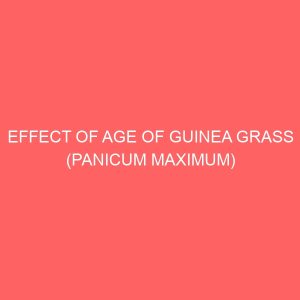

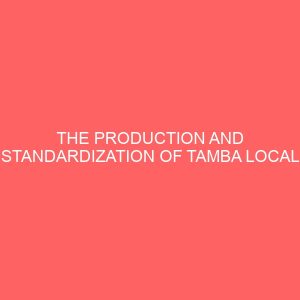

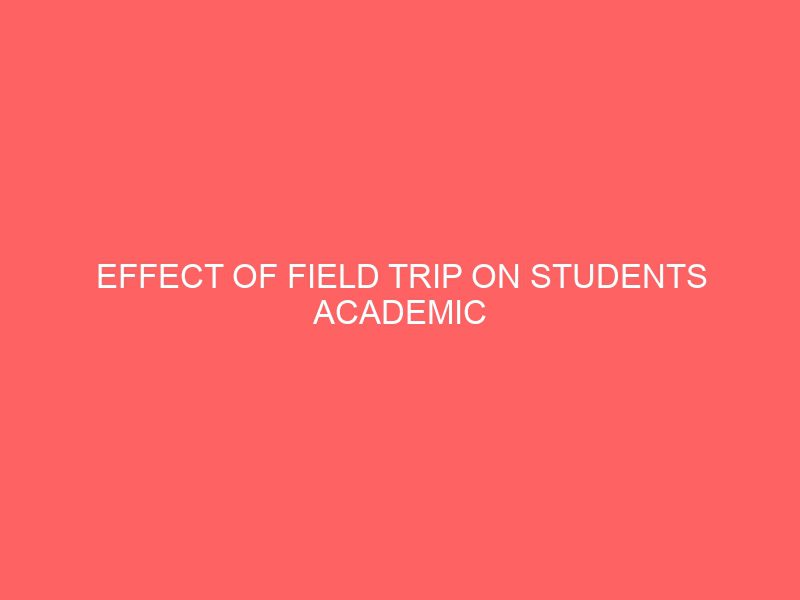
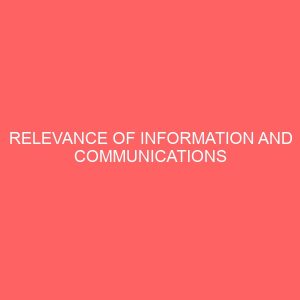
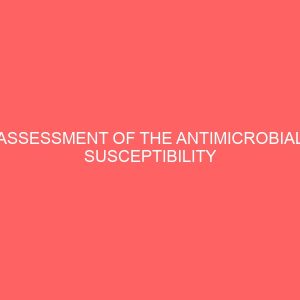
Abiola –
Projectslib is a great platform for all things related to thesis. Visit them and be thrilled.
Joseph –
Thanks for timely delivery